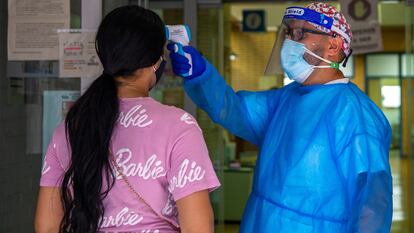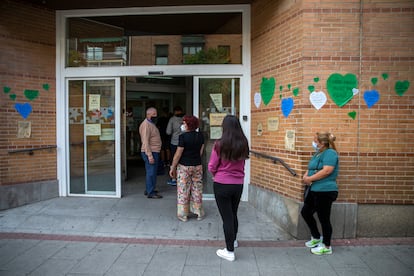In Spain, undocumented migrants face red tape to get tested for Covid-19
A domestic worker with coronavirus symptoms explains how she was forced to run around Madrid for various documents in order to obtain a PCR appointment

Paula, 27, an undocumented domestic worker from Honduras, recently called the health center in her area – Nueva Numancia in Vallecas, one of the 37 districts in the Madrid region in lockdown due to the high incidence of coronavirus infection. She had been in close contact with people who tested positive for Covid-19, and was now showing symptoms herself,
But Paula did not have a medical card giving her access to the Spanish healthcare system, and her local center turned her away. She then began a bureaucratic journey that has lasted a week to date, despite getting help from a neighbor who happens to be a doctor. Just securing an appointment for a PCR test has required updating her place of residence with the local authorities, and making several trips on the subway through the capital to do in-person paperwork that they wouldn’t let her do over the phone.
We find cases of people with symptoms who cannot go to the health center and who are not helped over the phone either, so they do not receive the necessary careCristina Hernández, Doctors of the World
Although her case is still to be confirmed, Paula suspects she picked up the coronavirus at a party thrown by neighbors on September 12. Three of the guests had tested positive and should have been self-isolating. But Paula only found this out four days later, when she began to feel ill and made some inquiries.
On September 17, she called the health center. “At first, they asked me about my symptoms – I told them that I felt bad, that my eyes hurt and I was finding it a bit hard to breathe. But as soon as I said I was undocumented and didn’t have a medical card, they told me they couldn’t give me a test,” she says. As a precautionary measure, she decided to stop going to both her morning job, which entails looking after an elderly man, and her afternoon job, which involves picking children up from school.
Immigrants with or without proper documentation have had the right to healthcare since 2018 – the year the legislation to exclude them approved in 2012 by the conservative Popular Party was overturned by a government decree. But bureaucratic hurdles have multiplied during the pandemic, producing predicaments like Paula’s.
Every region of Spain has a different system to deal with undocumented immigrants in need of healthcare. In Madrid, they are provided with what they call a DAR code. But when Paula went to her local health center, she was told that they couldn’t give her one because she was registered as a resident in another district of Madrid, Cuatro Caminos. Despite feeling rough, Paula took the subway to the Cuatro Caminos health center.

“They told me there that I could not come in person if I had symptoms,” she says. “That I should phone instead, and that if I was refused assistance because I have no medical card, then I should just have the tests done in a private clinic. But I don’t have the money for that, it costs almost €100. I can afford it even less now that I’ve had to stop working and don’t get paid.”
Cristina Hernández, from the Doctors of the World non-profit organization, which helps immigrants gain access to healthcare, explains the vicious circle: “Many people do not have the necessary documentation to receive assistance. Getting the DAR code requires going in person, but we find cases of people with symptoms who cannot go to the health center and who are not helped over the phone either, so they do not receive the necessary care.”
The Madrid regional government insists that any person requiring urgent medical attention is categorized as a transient patient and seen to: “This may have been a specific case, which does not reflect the course of action generally taken in these cases in the Madrid region,” a spokesperson said.
The problem, in the case of Paula and others like her, is a clash between bureaucracy and rights. “We have come across other cases in which the DAR code is not processed because they [the immigrants] do not comply with the requirements, which is to have been on Spanish territory for more than three months, to be able to prove it, and to have a valid passport,” says Hernández.
Facilitating the diagnosis
Pedro Gullón, an epidemiologist and expert in health-related social inequality, believes that even if it were for “purely utilitarian” reasons, diagnosis and follow-up of Covid-19 cases should be made as easy as possible for everyone. “Primary care doctors have been demanding areas outside the health centers where people can go directly to have PCR tests,” he explains. “In Navarre, for example, they have a space similar to the IFEMA field hospital that does this. Otherwise, we are not only putting the health of the person who is not receiving care at risk, but also the health of the entire population.”
After being refused assistance at the Cuatro Caminos health center, Paula tried registering as a resident in the city district where she currently lives. Again she went out with symptoms, and had to wait in line to try to sort out in person what was proving impossible to do over the phone. On September 23, she registered as a resident in Vallecas, went back to her local health center in the company of her neighboring doctor, and was finally given the DAR code. “If it weren’t for her, they wouldn’t have given it to me,” she says.
While Paula’s story sounds desperate, she was at least spared the challenge of a language barrier. For other immigrants, the scenario can be far worse. According to Cristina Arcas, from the non-profit Salud Entre Culturas (or Health Among Cultures), which has been dealing with this type of problem for years, there has been no assistance from the authorities in this regard.
“We provide them with mediators who speak their language so that they can get basic information about masks and confinement, and we also provide help with procedures that are sometimes complicated even for Spaniards,” she explains. “We were hoping that after the most agitated months passed, they would make things easier for these immigrants, but we are once again facing the same hurdles.”
We have a case where one domestic worker was forced to do a PCR test, and pay for it herself, if she wanted to continue working at that houseCarolina Elías, Active Domestic Service
The second wave began among immigrants, a demographic group that is often vulnerable, lacking decent housing, unable to stop working jobs that are cash-in-hand with no contract, and frequently with only a basic grasp of the Spanish language. These circumstances mean that infection can spread easily among them, as was the case in rural Aragón and Catalonia in July. Now, domestic workers, who often lack proper documentation too, are finding themselves in equally difficult circumstances.
Carolina Elías, from the Active Domestic Service association, says that many colleagues with symptoms are turning to natural remedies (of more than questionable effectiveness) in order to continue working. “In some homes, employers are taking advantage of the vulnerability of these workers, who are afraid of losing their jobs,” she says. “We have a case where one domestic worker was forced to do a PCR test, and pay for it herself, if she wanted to continue working at that house.”
Although Paula’s employers have allowed her time off work, the family of the elderly man she tends to in the mornings did ask her to make his meals when he was not home. “I told them I wouldn’t, because I don’t want to put him at risk,” she says, as she waits in her home with her one-year-old son for the PCR test appointment that required running around the city to get.
English version by Heather Galloway.
Tu suscripción se está usando en otro dispositivo
¿Quieres añadir otro usuario a tu suscripción?
Si continúas leyendo en este dispositivo, no se podrá leer en el otro.
FlechaTu suscripción se está usando en otro dispositivo y solo puedes acceder a EL PAÍS desde un dispositivo a la vez.
Si quieres compartir tu cuenta, cambia tu suscripción a la modalidad Premium, así podrás añadir otro usuario. Cada uno accederá con su propia cuenta de email, lo que os permitirá personalizar vuestra experiencia en EL PAÍS.
¿Tienes una suscripción de empresa? Accede aquí para contratar más cuentas.
En el caso de no saber quién está usando tu cuenta, te recomendamos cambiar tu contraseña aquí.
Si decides continuar compartiendo tu cuenta, este mensaje se mostrará en tu dispositivo y en el de la otra persona que está usando tu cuenta de forma indefinida, afectando a tu experiencia de lectura. Puedes consultar aquí los términos y condiciones de la suscripción digital.









































